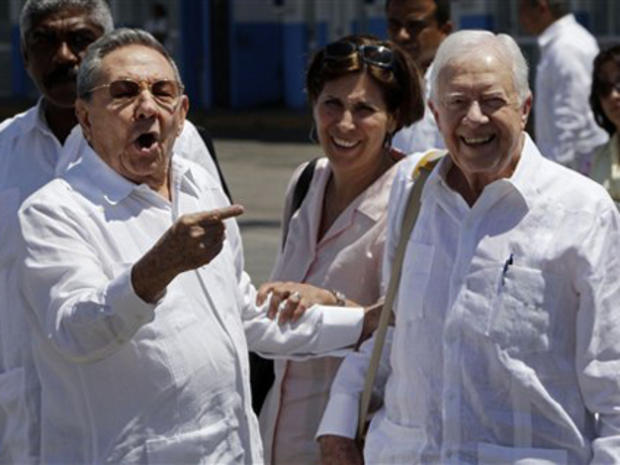Jimmy Carter winds up Cuba visit
Havana - Cuban President Raul Castro broke his habitual silence to weigh in at the end of a three-day visit by former President Jimmy Carter to the island, telling reporters at the airport that "the visit was good" and "Carter is an honest man."
His last day in Havana was packed with meetings starting with a 7 a.m. breakfast during which he listened to the opinions of dissidents, including 12 former prisoners who Raul Castro ordered released after negotiations with Cuban Cardinal Jaime Ortega.
The former President followed that up with a visit to a jailed American Alan Gross, recently sentenced in a Cuban court to 15 years for distributing illegal satellite equipment under a U.S. Government program to foment regime change on the island.
Despite rampant speculation that the Cubans might allow Gross to leave with him, Carter told a press conference that he had been told even before leaving Atlanta that this was not in the cards.
"Also this morning, I had a chance to meet with Alan Gross," said Carter, "a man whom I believe to be innocent of any serious threat to the Cuban government or to the Cuban people. He's been sentenced to a long term in prison and my hope is that he might also soon be given his own freedom."
He noted that Gross' lawyers were filing an appeal to the Cuban Supreme Court, which could reverse the verdict or that Raul Castro could issue an executive order releasing Gross on humanitarian grounds.
In what one Foreign Ministry official called the most important position taken by Carter at Wednesday's press conference, the former U.S. president said the U.S. should free the Cuban Five -- Cuban counterterrorism agents arrested by the FBI and convicted in 1998 of spying against exile groups and other U.S. targets. Carter said he had not "come here with the idea of arranging any kind of swap" of the Five for Alan Gross. "I think the two cases...are completely separate. I don't think they should be interrelated," he stressed. However, he noted that the five agents "should be released because they've served 12 years in prison now, and the original circumstances of their trial were considered to be doubtful."
And in an aside, Carter mentioned, "As you may know, I don't know if you know this or not, but there's been very close cooperation I understand between North American and Cuban intelligence in dealing with terrorism threats from al-Qaeda and from other organizations in the Gulf region."
Carter also came out very strongly in favor of the United States ending its economic embargo on Cuba while expressing the hope that the future will hold "complete freedom for all Cuban people, for speech, and for assembly, for travel, and that all internationally adopted standards of human rights would be enforced in Cuba."
The private visit sponsored by the non-governmental Carter Center aimed to "contribute to better relations" between the United States and Cuba.
"I think one of serious mistakes that my country continues to make is the trade embargo which is very damaging to the well-being of every citizen in Cuba and I believe it impedes rather than assists in seeing further reforms made," said Carter, adding that the Cuban Government does not respond to pressure from the U.S.
The former President told the press that he had met with United Nations and European Union representatives in Cuba as well as Ambassadors from various countries and they all told him that in the last two years while President Obama has been in office there has been a tightening of the restraints on the transfer of humanitarian funds to Cuba. Carter noted he would like to see these limitations removed.
The Obama Administration has eased restrictions on travel to Cuba mostly for Cuban Americans, and lifted some of the restrictions preventing Cubans, particularly artists and musicians, from traveling to the U.S. However, Carter said all prohibitions on travel by all Americans to the island should be lifted, describing them as a violation of their rights to go where they want.
Author Peter Kornbluh, who is currently working on a book about the history of back channel talks between Cuba and the United States, says he believes "Carter harbors regrets for not normalizing relations with Cuba during his presidency and is committed to doing what he can so that the Obama Administration does not pass up the opportunity to improve ties."
Asked if he would be willing to mediate between Washington and Havana to try to resolve differences that have festered for more than 50 years, Carter said yes, but that it was "extremely unlikely that both countries" would ask for his services.
Carter spent more than six hours with Raul Castro on Tuesday, first at a formal meeting and then at a late dinner in an upscale restaurant that went on from 9:30 p.m. to midnight after which the two strolled through the streets of colonial Havana to the Santa Isabel Hotel where Carter, his wife and delegation were staying. Among other officials Carter met with the Foreign Minister and the parliament president. And before Wednesday's press conference he spent an hour with former Cuban President Fidel Castro describing it as a meeting of "old friends."
A final message from Cuba was delivered by Raul Castro after seeing Carter off at Havana's Jose Marti International Airport. He told reporters that Cuba wanted to normalize relations with Washington, to discuss outstanding issues but only as long as the U.S. did not impose conditions on this process and did not expect Cuba to be subordinated to them.
Otherwise, he asked, what was the point of the Revolution?
Waving his arm to the heavens he expressed a preference to wait untold years more, even if it meant he would be watching normalization come from "another place."
